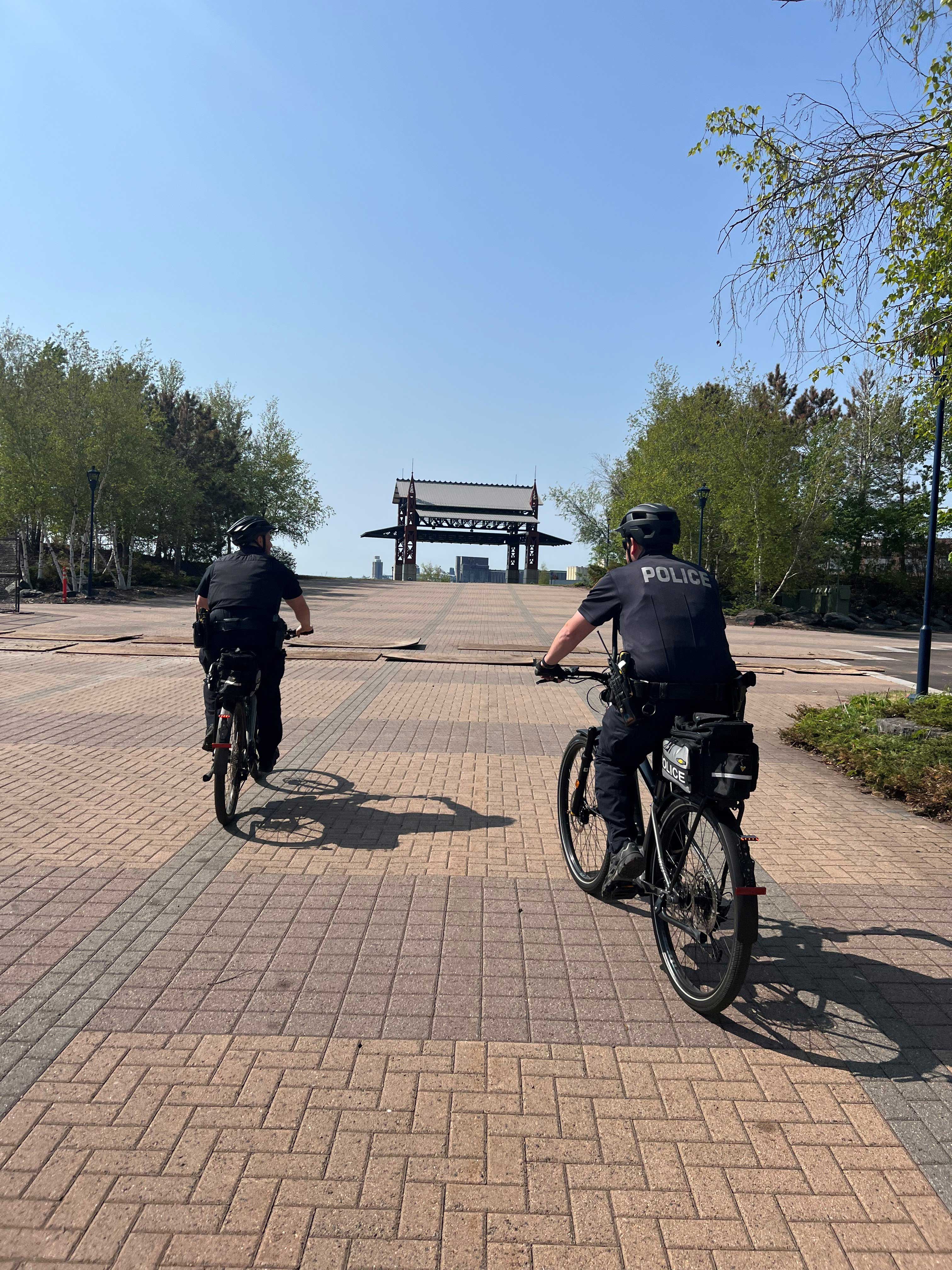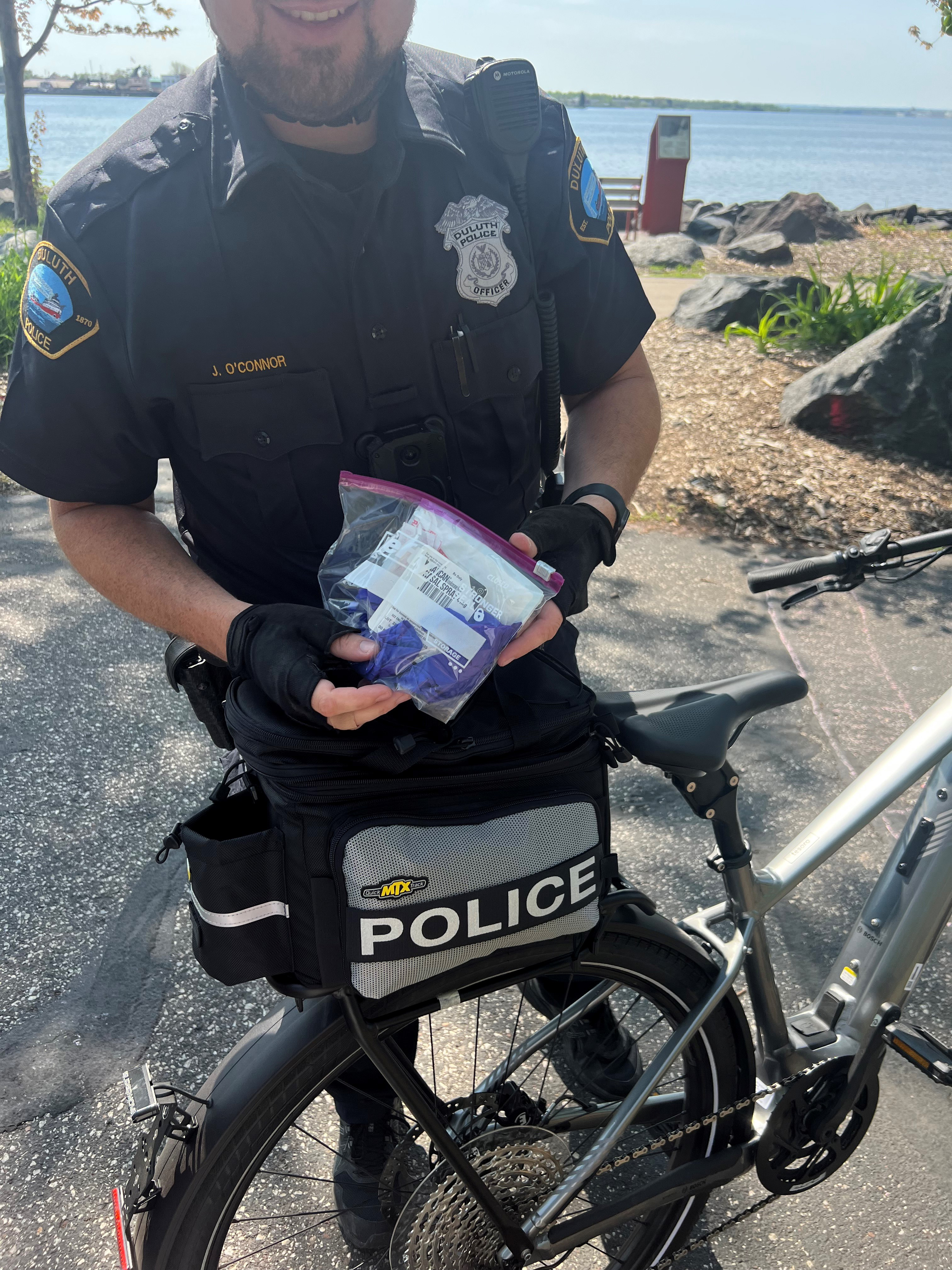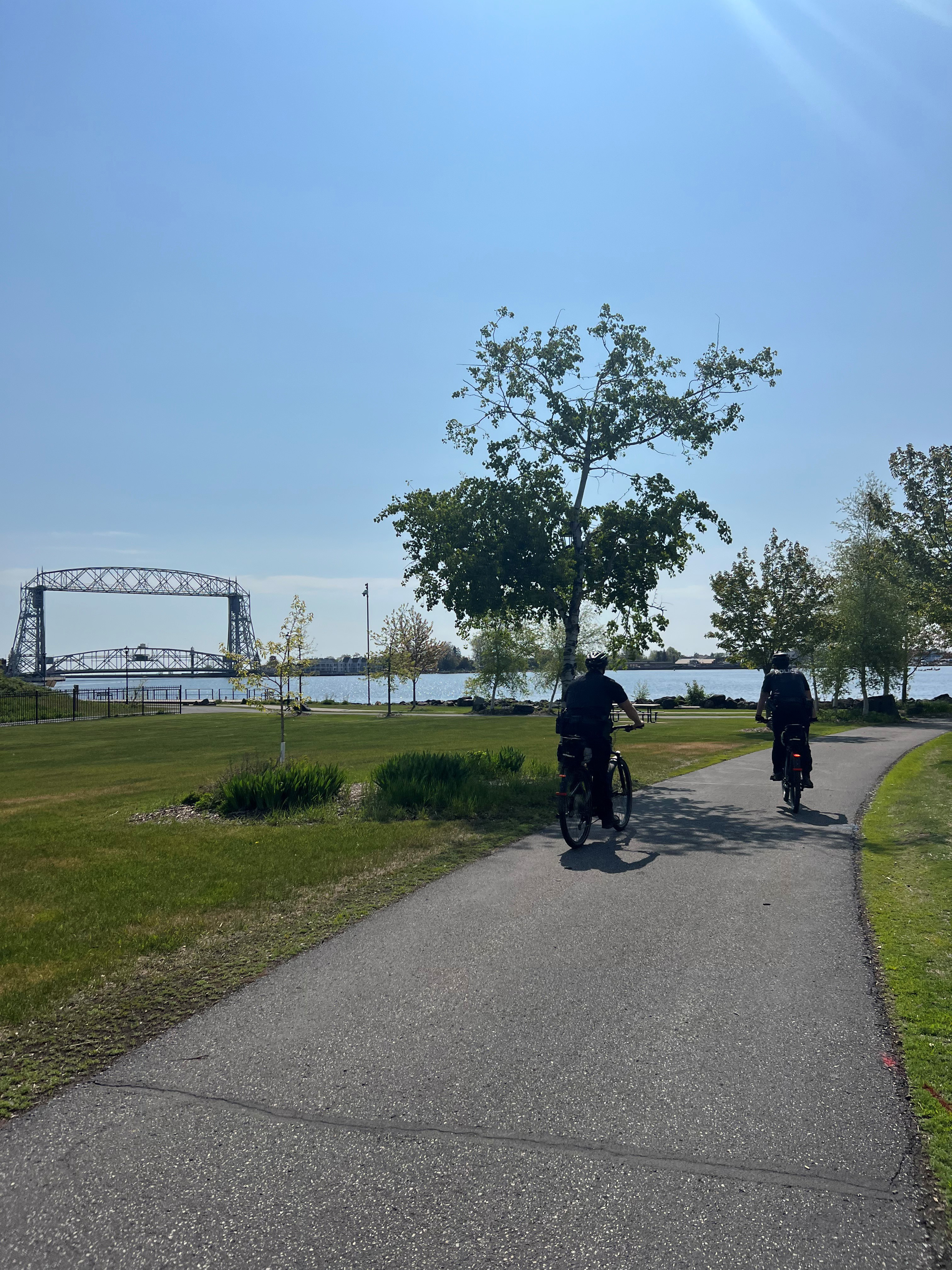DPD Receives New Electric Bikes for Bike Patrol Unit through Funding from Sustainability Office
Residents may see some new additions to the Duluth Police Department’s (DPD) fleet this summer – e-Bikes! Support from the Sustainability Office made the purchase of six pedal-assist Cannondale Tesoro bikes for the Bike Patrol Unit a reality. E-Bikes have become increasingly popular in the community, thanks in part to companies like e-Bike Duluth, a local rental company with locations in Lakeside and Canal Park. Electric assistance renders the hills of Duluth more easily explorable and accessible for tourists, locals, and now DPD. Importantly, e-Bikes produce zero carbon emissions, aligning with the goals of the City’s Climate Action Work Plan (particularly Action 1.4, “Reduce emissions from city fleet vehicles and employee commute”) and commitment to carbon neutrality by 2050. Recently, DPD Officer Jeremy O’Connor and Joshua Kneeland took the time to demonstrate the new bikes, as well as provide more insight into their use and the way they fit into City-wide goals.

The City of Duluth Sustainability Office takes a whole-City approach to the implementation of sustainable practices, particularly when it comes to reducing Municipal greenhouse gas (GHG) emissions. In 2022, Vehicle Fleet accounted for 25% of total Municipal emissions. Other sectors that contribute to emissions are Waste and Wastewater, Buildings and Facilities, Streetlights and Traffic Signals, which altogether accounted for 14,170 metric tons of CO2e last year. While some sectors – particularly Waste and Wastewater – have seen significant decreases in annual emissions, fleet output has generally remained steady. This may be attributed to several factors, including the relevant recency of affordable electric vehicle (EV) technologies, as well as an increase in fleet vehicle miles traveled during snowier winters (which necessitate more plowing and de-icing). Thus, City teams have kept a keen eye on opportunities to purchase hybrid or electric fleet options. Officer O’Connor says, “Hybrid squad cars are what we’re using right now because of supply chain issues limiting access to EVs as well as a lack of many police packaged EVs. I’d say almost all of our squad cars right now are hybrid cars – definitely all the ones that have been ordered in the last few years.” To assist with the prioritization of clean fleet purchases, funding from the Sustainability Office has been put towards closing capital funding gaps – such as, for example, the new E-Bikes and a hybrid Fire Department ladder truck. EVs and e-Bikes are an especially effective way that the Police Department can contribute to sustainability goals, due to the amount of time spent in vehicles while on patrol. “We’re constantly in our cars”, says Officer Kneeland. As the City continues to work towards a cleaner fleet, the new e-Bikes will decrease emissions, improve DPD’s reach, and pave the way for further investment.

In addition to reducing carbon emissions, e-Bikes provide several benefits for safety and accessibility. Duluth’s hills can be tricky to navigate and difficult to summit on a bike, as residents know all too well. “The hills are big”, says Officer O’Connor. “A lot of the reason we’re stuck in squad cars is because of the hills…but it’s a lot easier to get around when you’re on a bike versus in a car.” Given the large expanse of trails and outdoor space in Duluth, the bikes will also make it easier for Officers to access emergencies that are inaccessible by car. “We can take these on trails, and these bikes really give us the opportunity to expand our area and our reach”, continues Officer O’Connor. “Before, we could only bike a certain distance before we’d start burning out. But now we can go further with these, and go further up the hill with these. It’ll be really nice. Plus, if we need to – for example, out in the Gary New Duluth area, if there’s a call on a trail that we need to get to – we can throw these on a bike rack and just drive the squad car out there and jump on these.” The Department currently has two fat bikes for use in the winter, but Officers are excited to see how the E-Bikes will fare. Adds O’Connor, “the tires are pretty wide right now, they’re essentially the standard mountain bike tire… I’m curious to see how they do in the snow.”
Where can residents expect to see the bikes around town? In the summer, largely where the crowds are: Downtown, Park Point, Canal Park and the Lakewalk, when not actively responding to a call. Officers will also utilize the bikes at Grandma’s Marathon, the Air Show, Fourth Fest, and many other events at Bayfront Park. Some may remember the recent implementation of a 10 mph speed limit on the Lakewalk, introduced by a City Council ordinance in August 2022. Should bikers forget about the limit, will they be stopped by someone on the Bike Patrol Unit? “We can”, responded Officer O’Connor, “but it will probably be just a reminder or an educational stop, like many of our stops are.” The E-Bikes can go up to 29 mph – and have been tested on Harbor Drive – and have horns to assist in clearing the way and alerting the public as needed. The bikes also carry bags with medical supplies and other emergency response necessities. A 1991 study found that bicycle patrol, as a form of community policing, carries a multitude of benefits. Per the study, police bike patrols provide “positive community relations, improved response time to emergency calls, lower cost than patrol cars, the ability to patrol secluded areas, the ability to surprise criminals, the physical benefits to the police officer, and improved police morale.” In summary, event-goers and Lakewalk strollers can know that officers will be able to respond to emergencies more efficiently this summer.
The City has bold goals of increasing multimodal, carbon-free transportation in the community, which begins with the Municipal fleet. New projects such as a $25 million grant to redesign W. Superior Street, as well as federal and state financial incentives for electric vehicles, provide further opportunities to reimagine sustainable transportation. In the meantime, the e-Bikes serve as an important first step.

Feeling envious of the Bike Patrol Unit’s new rides? Thanks to new legislation, an EV or e-bike purchase might be more feasible than ever. Via rebates introduced in the Inflation Reduction Act, those with an adjusted gross income of less than $300k for couples filing jointly, $250k for heads of households, or $150k for all other filers may receive a rebate of up to $7,500 on EVs purchased between 2023 and 2032. Additionally, during the 2023 MN Legislative Session, a bill was passed allocating funding to the MN Senate transportation budget for rebates of up to $1,500 on purchases of electric-assisted bikes. Article 4, Section 77 of the Transportation Finance Bill states that any resident individual taxpayer aged 15 or older and not claimed as a dependent in the taxable year may receive a rebate of up to 75% of the bicycle cost. The cost percentage decreases by one percentage point until the percentage equals 50% for each $4,000 of the individual’s adjusted gross income in excess of $50k for joint filers and $25k for all other filers. For example, an individual with an adjusted gross income of $35,000 would receive a rebate of 72.5% of the total bike cost. The program will go into effect on July 1st, 2024.
It will be an exciting summer as the bikes are put to use for the first time. Overall, the new e-Bikes aim to increase sustainability, safety, and security. Officer O’Connor summed it up nicely, concluding that “it’s better for the environment, and gives more face-to-face interaction with the public. It gets us to areas that we can’t go in vehicles, like trails.”
Thank you to Officers O’Connor and Kneeland for their time showcasing this new investment!




